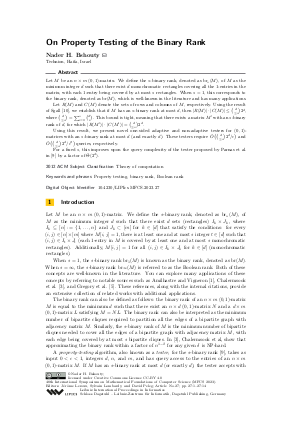On Property Testing of the Binary Rank
Author Nader H. Bshouty
-
Part of:
Volume:
48th International Symposium on Mathematical Foundations of Computer Science (MFCS 2023)
Part of: Series: Leibniz International Proceedings in Informatics (LIPIcs)
Part of: Conference: Mathematical Foundations of Computer Science (MFCS) - License:
 Creative Commons Attribution 4.0 International license
Creative Commons Attribution 4.0 International license
- Publication Date: 2023-08-21
File

PDF
LIPIcs.MFCS.2023.27.pdf
- Filesize: 0.68 MB
- 14 pages
Document Identifiers
Subject Classification
ACM Subject Classification
- Theory of computation
Keywords
- Property testing
- binary rank
- Boolean rank
Metrics
- Access Statistics
-
Total Accesses (updated on a weekly basis)
0PDF Downloads0Metadata Views
Abstract
Let M be an n × m (0,1)-matrix. We define the s-binary rank, denoted as br_s(M), of M as the minimum integer d such that there exist d monochromatic rectangles covering all the 1-entries in the matrix, with each 1-entry being covered by at most s rectangles. When s = 1, this corresponds to the binary rank, denoted as br(M), which is well-known in the literature and has many applications.
Let R(M) and C(M) denote the sets of rows and columns of M, respectively. Using the result of Sgall [Jiří Sgall, 1999], we establish that if M has an s-binary rank at most d, then |R(M)| ⋅ |C(M)| ≤ binom(d, ≤ s)2^d, where binom(d, ≤ s) = ∑_{i=0}^s binom(d,i). This bound is tight, meaning that there exists a matrix M' with an s-binary rank of d, for which |R(M')| ⋅ |C(M')| = binom(d, ≤ s)2^d.
Using this result, we present novel one-sided adaptive and non-adaptive testers for (0,1)-matrices with an s-binary rank at most d (and exactly d). These testers require Õ(binom(d, ≤ s)2^d/ε) and Õ(binom(d, ≤ s)2^d/ε²) queries, respectively.
For a fixed s, this improves upon the query complexity of the tester proposed by Parnas et al. in [Michal Parnas et al., 2021] by a factor of Θ(2^d).
Cite As Get BibTex
Nader H. Bshouty. On Property Testing of the Binary Rank. In 48th International Symposium on Mathematical Foundations of Computer Science (MFCS 2023). Leibniz International Proceedings in Informatics (LIPIcs), Volume 272, pp. 27:1-27:14, Schloss Dagstuhl – Leibniz-Zentrum für Informatik (2023)
https://doi.org/10.4230/LIPIcs.MFCS.2023.27
BibTex
@InProceedings{bshouty:LIPIcs.MFCS.2023.27,
author = {Bshouty, Nader H.},
title = {{On Property Testing of the Binary Rank}},
booktitle = {48th International Symposium on Mathematical Foundations of Computer Science (MFCS 2023)},
pages = {27:1--27:14},
series = {Leibniz International Proceedings in Informatics (LIPIcs)},
ISBN = {978-3-95977-292-1},
ISSN = {1868-8969},
year = {2023},
volume = {272},
editor = {Leroux, J\'{e}r\^{o}me and Lombardy, Sylvain and Peleg, David},
publisher = {Schloss Dagstuhl -- Leibniz-Zentrum f{\"u}r Informatik},
address = {Dagstuhl, Germany},
URL = {https://drops.dagstuhl.de/entities/document/10.4230/LIPIcs.MFCS.2023.27},
URN = {urn:nbn:de:0030-drops-185616},
doi = {10.4230/LIPIcs.MFCS.2023.27},
annote = {Keywords: Property testing, binary rank, Boolean rank}
}
Author Details
References
- Jérôme Amilhastre, Marie-Catherine Vilarem, and Philippe Janssen. Complexity of minimum biclique cover and minimum biclique decomposition for bipartite domino-free graphs. Discret. Appl. Math., 86(2-3):125-144, 1998. URL: https://doi.org/10.1016/S0166-218X(98)00039-0.
- Maria-Florina Balcan, Yi Li, David P. Woodruff, and Hongyang Zhang. Testing matrix rank, optimally. In Proceedings of the Thirtieth Annual ACM-SIAM Symposium on Discrete Algorithms, SODA 2019, San Diego, California, USA, January 6-9, 2019, pages 727-746, 2019. URL: https://doi.org/10.1137/1.9781611975482.46.
- Parinya Chalermsook, Sandy Heydrich, Eugenia Holm, and Andreas Karrenbauer. Nearly tight approximability results for minimum biclique cover and partition. In Andreas S. Schulz and Dorothea Wagner, editors, Algorithms - ESA 2014 - 22th Annual European Symposium, Wroclaw, Poland, September 8-10, 2014. Proceedings, volume 8737 of Lecture Notes in Computer Science, pages 235-246. Springer, 2014. URL: https://doi.org/10.1007/978-3-662-44777-2_20.
-
Dana Ron. Private Communication.

- David A. Gregory, Norman J. Pullman, Kathryn F. Jones, and J. Richard Lundgren. Biclique coverings of regular bigraphs and minimum semiring ranks of regular matrices. J. Comb. Theory, Ser. B, 51(1):73-89, 1991. URL: https://doi.org/10.1016/0095-8956(91)90006-6.
- Robert Krauthgamer and Ori Sasson. Property testing of data dimensionality. In Proceedings of the Fourteenth Annual ACM-SIAM Symposium on Discrete Algorithms, January 12-14, 2003, Baltimore, Maryland, USA, pages 18-27, 2003. URL: http://dl.acm.org/citation.cfm?id=644108.644112.
- Yi Li, Zhengyu Wang, and David P. Woodruff. Improved testing of low rank matrices. In The 20th ACM SIGKDD International Conference on Knowledge Discovery and Data Mining, KDD '14, New York, NY, USA - August 24 - 27, 2014, pages 691-700, 2014. URL: https://doi.org/10.1145/2623330.2623736.
- Yonatan Nakar and Dana Ron. On the testability of graph partition properties. In Eric Blais, Klaus Jansen, José D. P. Rolim, and David Steurer, editors, Approximation, Randomization, and Combinatorial Optimization. Algorithms and Techniques, APPROX/RANDOM 2018, August 20-22, 2018 - Princeton, NJ, USA, volume 116 of LIPIcs, pages 53:1-53:13. Schloss Dagstuhl - Leibniz-Zentrum für Informatik, 2018. URL: https://doi.org/10.4230/LIPIcs.APPROX-RANDOM.2018.53.
- Michal Parnas, Dana Ron, and Adi Shraibman. Property testing of the boolean and binary rank. Theory Comput. Syst., 65(8):1193-1210, 2021. URL: https://doi.org/10.1007/s00224-021-10047-8.
- Jiří Sgall. Bounds on pairs of families with restricted intersections. Comb., 19(4):555-566, 1999. URL: https://doi.org/10.1007/s004939970007.
